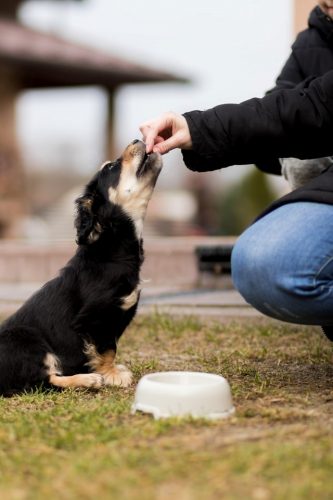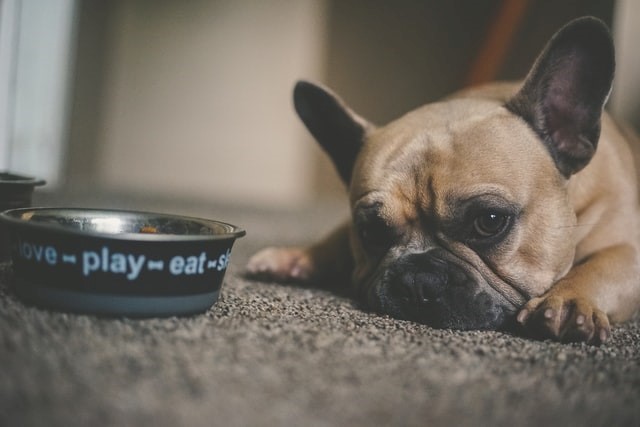New Puppy Not Eating? – What You Can Do About It
Puppies can be a cute, cuddly, fun, and very welcome addition to any household, but they also may face some obstacles that they often need help to overcome. One of those obstacles is often food-related, more specifically with eating in general.
Maybe your newborn puppy seemed to be enjoying their food for a while and then suddenly stopped, or maybe they have refused to eat at all since you brought them home. Either way, you should try not to worry too much, as this is a fairly common problem that can be solved without any kind of serious intervention.
If you want to know why your new puppy is not eating and what you can do about it, keep reading for our tips and tricks.
Why Is My New Puppy Not Eating?

There are lots of varied reasons that could be contributing to why your new puppy is not eating. Here are some of the most common reasons:
Stress
It can be overwhelming for a puppy to try and get used to everything that goes on in its new home. There is no specific time period that it takes for a puppy to fully adjust to a new environment, especially if there has been a recent change in their daily routine.
If you have brought your pup home relatively recently, it could still be missing the presence of its mother and littermates. Or, if you or another member of your household is not around as much or even much more than you used to be, this could also be unsettling for your pup.
It could even be that another animal in your household is tormenting them! Keep an eye out for any possible sources of stress in your pup’s home life.
They Do Not Recognize They Are Hungry
That overwhelming feeling that some pups may get while adjusting to a new environment may distract them from realizing they are even hungry in the first place. The puppy may just be so busy exploring, playing, and sleeping in an endless cycle that they completely forget about the part where they have to eat!
A puppy is still pretty brand-new to this world, so they may not recognize the signs that they are hungry, as well as the consequences that result from not eating.
Pickiness
Just like people, dogs do have different food and taste preferences. If your puppy liked the food before, maybe they have simply changed their minds – it can be like dealing with a young child! It could be the flavor, the texture, the size of the kibble, a preference for wet vs dry dog food…or maybe they have been getting too many table scraps and are holding out for the good stuff. You may just have a picky eater on your hands.
Illness or Infection
Several illnesses or infections could be making your pup not want to touch their food. This can include digestive infections such as the Parvo virus, bacteria, intestinal worms, and respiratory infections such as kennel cough.
While vaccinations can prevent dogs from contracting some of these illnesses and infections, young puppies are typically not fully vaccinated until they are around 17 weeks old, so they remain at risk until they have had all their shots.
Pain
Whether you are always watching them or not, puppies can get themselves into all sorts of trouble! Maybe they had a slip or fall that caused them some pain or injury, or they were playing too rough with another dog or human. They could also be experiencing discomfort from teething or getting something stuck in their mouth from chewing on a broken toy or even a stick.
High Temperatures
If it is summer in your area or you live in an especially hot climate year-round, this could certainly cause a loss of appetite in your puppy. Many people also tend to have suppressed appetites when the weather is especially hot.
What You Can Do If Your New Puppy Is Not Eating

Unlike adult dogs, puppies just do not have the body fat reserves or liver function necessary to make sufficient glucose levels when they are going through periods of starvation.
Because of this, they should not go without food for a maximum of 12 hours before requiring medical intervention. This is especially true for toy breed puppies, as they are prone to hypoglycemia (or really low blood sugar) if they miss even one meal.
Here is a list of tips and tricks to get your puppy eating again:
- If you think that they are not eating because they do not like the food, let them try a variety. You can try different brands, proteins, and wet and dry foods to see what works for your pup.
- If you do not want to go through the time and expense of trying various dog food, try adding something extra to their current meals. You can try soaking dry food in warm water or chicken broth to make it softer and add some taste, and you can even do this in a blender to create more of a slurry. You could also try adding something like plain yogurt (without xylitol, as it can be dangerous for dogs), peanut butter, or other wet food to pique their interest and mixing it with their normal food in their food bowl.
- Put their food in the microwave – not until it is hot, but just so it gets warm. This can give the food a stronger smell, which may make it more enticing to your pup.
- Get an interactive puzzle feeder where your puppy must figure out how to get to the food. This can provide their mealtimes with more fun and stimulation and can help them develop a healthier eating habit.
- Stop or cut down on the number of treats and table scraps you give your puppy. They will likely be disappointed, but they will learn that their meals need to come first. It also helps to have a feeding schedule in place.
- Hand feed your puppy and praise them when they take the puppy food. They may just need a little positive reinforcement and encouragement.
- If you live in a hot area, make sure they have ways of keeping cool and that their food bowl is in a cooler area of your home.
- Go for a walk or have some playtime before meals. Exercise may increase the dog’s appetite in general.
When to Seek Help
If none of the above methods work and your puppy is still refusing its puppy food, consult with your vet as soon as possible if your puppy is experiencing any of the following symptoms:
- Lethargy
- Diarrhea/vomiting
- Weight loss
- Signs of hypoglycemia, like seizures, weakness, and a drunken-like gait
- A yellowish color in the whites of their eyes, gums, and/or the inside of their ears
- If you know there are other ill dogs at the shelter or breeder from which you got your puppy
Do not wait too long to contact your vet about your new puppy not eating. It may not seem like a big deal if your puppy misses a meal or two, but it really can make a big difference in their overall health.

